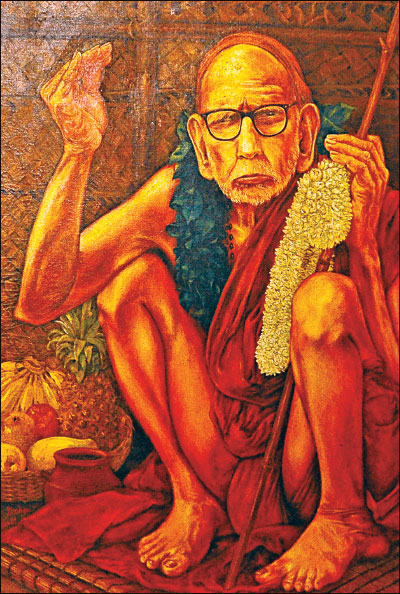By Periyava
Jagadguru Sri Chadrasekharendra Saraswati Mahaswamiji (20 May 1894 - 8 January 1994)

Translation from Tamil by V. Krishnaraj
குற்றத்தைக் குறைக்கும் வழி : தெய்வத்தின் குரல் (முதல் பகுதி)
The path to Crime Reduction: Deivathin Kural Part one
http://www.kamakoti.org/tamil/part1kural64.htm
Why does the government exist? The strong may cause Himsa to the weak. The bigger crowd may cause trouble to the smaller crowd. A group of people may join hands to annex property and seize a person’s valuables under duress. Government enforced law and order.
What does the government do to prevent such acts? It delivers punishment. Many are prevented from crime by fear of punishment.
The government gives disproportionately more Himsa (violence) than the Himsa rendered by the perpetrator. A ten-rupee loss from theft causes a little hardship to the victim but the thief experiences greater hardship by stay in jail for many days. By administering this punishment, the thief will not do the crime again, as assumed by the judicial system. Others may not do the crime fearing disproportionate punishment: That is the established law. Looking at the psychology of people, we must accept this premise.
The government must simultaneously popularize another path for crime prevention and reduction. Punishing a criminal after commission of a crime and advising a crime-prone person lacking Dharmic disposition not doing the crime fearing punishment are a second-tier strategies. The most appropriate scheme is to create conditions when a person does not even think of doing the crime.
Firstly, a person inflicts Himsa, and then the Criminal Justice system inflicts greater Himsa. This is the expedient criminal justice system, (= Sāstraic justice = political science). This Artha Śāstram (Criminal justice system) must be under the purview of Dharma Śāstram, which the government must hold as an ideal.
If the government creates and safeguards conditions compatible with Dharma Sastras, the tendency to commit crimes among people will gradually diminish. If the explicators and the observers of Dharma in the community live exemplary lives with exemplary conduct and peaceful disposition, these will bring down the crime rate like fights, disputes…
The elected and the office holders must be upholders of Dharma. They must build confidence in the people by doing public good and not profiting for themselves. They conduct government business according to Dharma and should educate the public in the Dharmic conduct of the people. The people will act under Dharma.
The government officials and the people should together must do the Dharmic acts. The Govt. should create conditions for the Dharmiṣters (Dharma followers) to do people’s work.
The government must pay attention to encourage and increase Dharmic workers instead of expanding the police departments and the court system. The Government must encourage people who put aside selfish goals, resist money making schemes out of advisory boards, have philanthropy as the goal and explicate Dharma to others. There is more power and prestige in living such noble life than to hold didactic talks.
The expansion of courts means expansion of crime. Building temples instead will help spread peace. In the olden days, a king built temples instead of courts. They renovated the old temples. The cultural, musical, dance-drama, and festival events were dedicated to the temples. People worshipped in the temples and lead the life of peace-lovers. In the olden days, there were never disputes, fights and social turbulence as now.
Education of the public to be good citizens is much easier than prevention and enforcement of the law. When the government extends its respect to peace-lovers, virtuous people, Dharmiṣters, there will be spread of good qualities among people.
Hex={CC,66,FF}